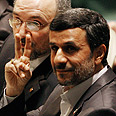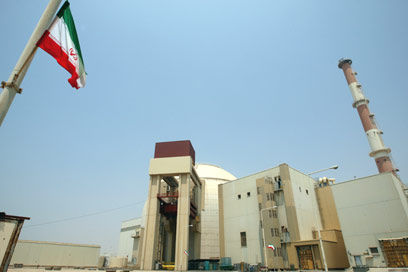
France: Iran nuke drive raises risk of strike
In surprisingly frank comments at New York panel discussion, Paris' UN envoy follows up on President Sarkozy's statement that there could be 'preventive strike' against Islamic republic
France's UN envoy warned that Iran faces the risk of a military strike if it pursues its nuclear drive because certain countries would not accept it having an atomic weapon.
In surprisingly frank comments at a New York panel discussion, Ambassador Gerard Araud on Tuesday followed up on President Nicolas Sarkozy's statement that there could be a "preventive strike" against the Islamic republic.
Related stories:
- Al-Qaeda slams Iran 'conspiracy theories'
- Iran says could deploy navy near US coast
- Ahmadinejad: Zionist regime is not sacred
Asked what would happen if Iran reaches the threshold of a nuclear weapon, Araud said: "Personally I am convinced that some countries won't accept this prospect."

Bushehr nuclear facility. 'Disastrous consequences' (Photo: AFP)
The envoy said the danger of conflict was why France, Britain, Germany, the United States, Russia and China were trying to negotiate with Tehran.
"If we don't succeed today to reach a negotiation with the Iranians, there is a strong risk of military action," according to Araud, who did not say who would be likely to carry out such action.
"It would be a very complicated operation. It would have disastrous consequences in the region," said the ambassador, who has negotiated with Iran in the past.
"All the Arab countries are extremely worried about what is happening" with Iran's nuclear drive, he added.
Western leaders have repeatedly accused Iran of seeking a nuclear bomb, and the UN Security Council has passed four rounds of sanctions against the Islamic Republic, which Araud said are now biting.
'Not a stone has been left unturned'
Iran insists its nuclear enrichment program is entirely peaceful and has refused to halt enrichment or allow inspections demanded by the international community.
It has also objected to Sarkozy's "preventive strike" comments, and said it would hit back at any attack.
Araud said that European negotiators had concluded that Iran does not want to negotiate with the international community and was "moving forward" with its program.
"We have tried everything. Not a stone has been left unturned," he added.
The French envoy and others on the Security Council have said they cannot see any move to order new sanctions in the next six months at least.
Russia and China both oppose any new punitive measures, and at this month's UN General Assembly meeting their ministers called again for a negotiated settlement with Iran.
The United States and Western allies have called for existing sanctions to be applied more rigorously, and both the United States and Israel have refused to rule out military action to prevent Iran from obtaining nuclear weapons.
EU foreign policy chief Catherine Ashton is negotiating with Iran on possible new talks. She met Iran's Foreign Minister Ali Akbar Salehi on the sidelines of the UN assembly.
Foreign ministers from Britain and France also held talks with Salehi in New York to reaffirm their opposition to his country's nuclear program.
Iran's President Mahmoud Ahmadinejad offered, in an interview with the New York Times last week, to halt Iran's production of low-enriched uranium if the international community provided uranium.
Ahmadinejad said Iran wanted 20% enriched uranium for a medical reactor that makes isotopes for cancer treatment.
Western countries say Iran already has enough uranium for the reactor and that any additional uranium would be used to make weapons.
- Follow Ynetnews on Facebook
- Receive Ynetnews updates directly to your desktop










